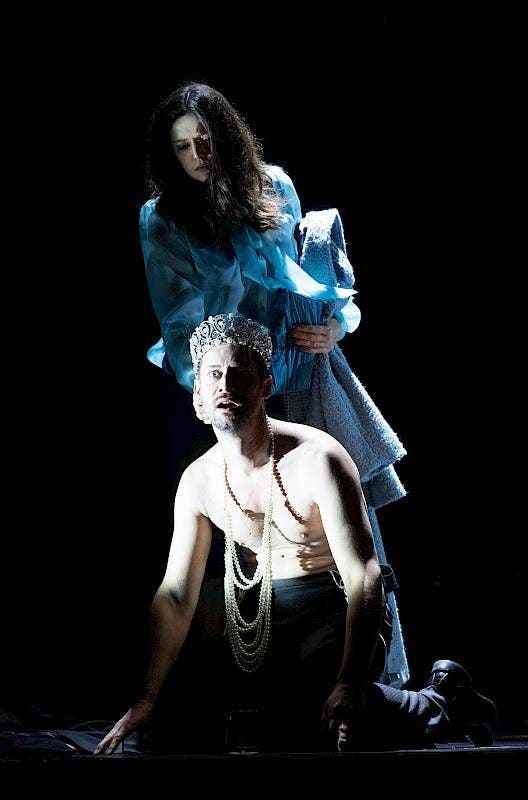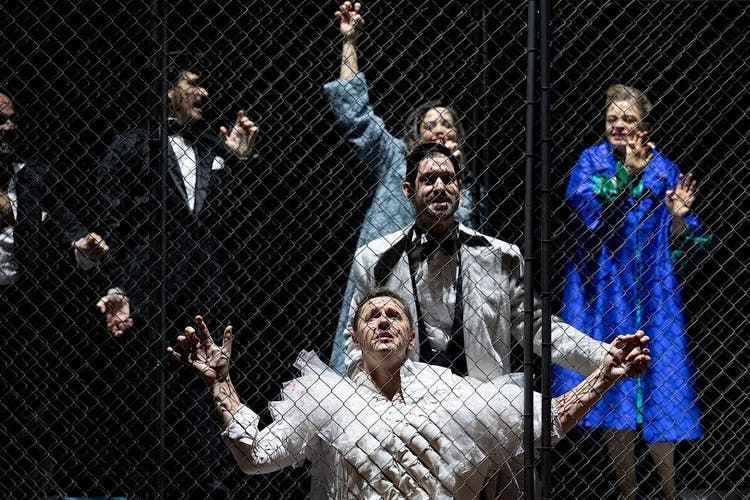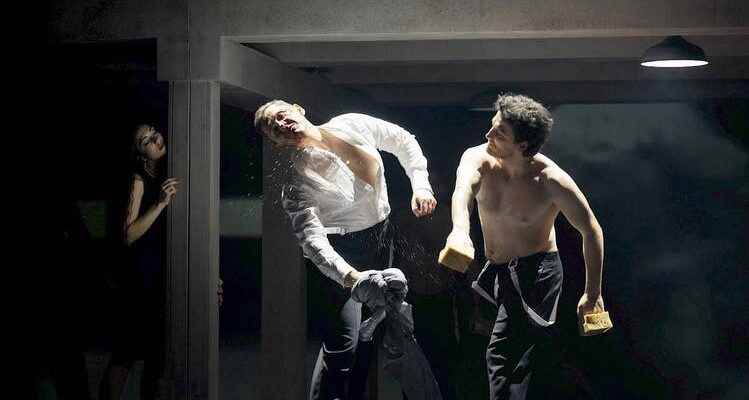Francesco Cavalli’s «Eliogabalo» describes the life of a ruler who didn’t care about gender boundaries. Musically, too, this opera is one of the most gripping excavations in decades.
Emperor Eliogabalo’s (Yuriy Mynenko, middle) love for powerful soldiers is almost fatal.
«Not suitable for minors!» – this is the warning on the website of the Zurich Opera House. How funny, one thinks, has the new sensitivity to everything that could in any way cause offense reached Mozart, Verdi and Wagner? Reasons for this could certainly be found, but this is not about lustful Moors or hunchbacked fools, but about a real monster.
The Zurich Opera has dug up a play about the Roman Emperor Heliogabalus – who, if you believe the ancient traditions, was a real libertine and, until his violent death after only four years on the throne, had the dubious honorary title of the worst ruler among historians history deserves.
However, many things could have been completely different – that is what makes the character and the opera, which was only rediscovered in 1999, and which the Monteverdi student Francesco Cavalli wrote about the wicked emperor for the 1667 Venetian carnival. Perhaps Elagabalus was simply the Empire’s first openly queer ruler.
affront to the establishment
One thing is certain: Varius Avitus Bassianus, as he was originally called, demonstrably indulged in a cult of the sun god Elagabalus that had developed in Syria. Like the Egyptian pharaoh Akhenaten before him, he wanted to place him above the ancient gods of the empire, i.e. deprive Jupiter and his consorts of power. That in itself was an unprecedented affront to the Roman establishment. But people were even more excited about the idiosyncratic rites of this sun cult, in which the boundaries between the sexes were allegedly not only blurred, but also sex was practiced in all conceivable constellations, more or less publicly.
Whether all of this is true can hardly be verified. But doesn’t it sound familiar? Egomaniac ruler, sexualization of everyday life, gender fluidity? Yes, the Zurich Opera House seems to have found the play of the hour, and the fact that Cavalli’s “Eliogabalo” is over 350 years old and its strange “hero” has been dead for exactly 1800 years does not detract from this coup in the slightest. That makes things even more fascinating – especially since this opera is one of the most gripping excavations in decades, also musically.

Women are Eliogabalo only a means to an end, he himself sometimes feels like a woman.
In Zurich, the conductor Dmitry Sinkovsky has the best advocate for the bold piece, which at the time, probably for political or moral reasons, was shelved unplayed and only survived by chance. Sinkovsky has instrumented the score, which has survived as a short score without a fixed orchestration, as in the case of Monteverdi, in an appropriately colorful and pointed way, skilfully condensing the playing time from the original four to almost three hours. That makes sense, because it allows the music, which shimmers magnificently between late Renaissance and early Baroque, to develop in an uninterrupted arc of tension.
Sinkovsky allows this stream of sound to pulsate rhythmically incessantly, the style-typical changes between recitative passages and the short arioso unfoldings, which only become closed arias in the subsequent operatic story, succeed completely organically. Melodically, some of these moments are among the most beautiful that early opera has produced – some phrases are even reminiscent of the wonder duet “Pur ti miro” from Monteverdi’s “L’incoronazione di Poppea” (which may have come from Cavalli). Zurich’s in-house original sound ensemble La Scintilla plays it with a colorfulness and delicacy that is unusual even for this great formation. She is also really celebrated by the audience.
Equally celebrated is the inspiring conductor, who also excels as a violinist during the performance and even as a countertenor at the beginning of the third act – with a beguilingly sung interlude from Cavalli’s opera «Artemisia». Their text “Dammi morte o libertà” can perhaps be understood as a subtle commentary, because Sinkovsky’s commitment against his will also makes the current world situation – and with it the actions of another “bad ruler” – part of this already dense evening. Dmitry Sinkovsky is Russian by birth.
Luckily, the opera house resisted all attempts to uninvite Sinkovsky. This is remarkable for a second reason: the title role, of all things, is played by a Ukrainian singer, the countertenor Yuriy Mynenko. As was made known in the run-up to the premiere, Mynenko was only able to travel to Zurich after an exemption from the Ukrainian Ministry of Culture and on adventurous detours. Working with Sinkovsky was not a problem during the rehearsals, those involved assure us, and this is exactly the impression one gets during the performance: Through the intensive interaction with the conductor, Mynenko becomes the musical power center around which all the other characters revolve like satellites.
Calixto Bieito, the director of the production, underlines this focus by scenically adding many aspects to the role of Elagabalus that the librettist Aurelio Aureli could not show in his time. Among them the guaranteed bisexuality of the emperor, who is said to have had fun with countless women as well as with well-equipped soldiers; his lust for women’s clothes, which he also wore in public; and finally even his game with a trans-identity avant la lettre, which provokes his contemporaries to the bone, which here ends in an implied self-castration.

Played out: Eliogabalo (Yuriy Mynenko) is killed by his opponent Alessandro Severo (David Hansen) and sunk in the Tiber.
Burning glass realism
That’s tough stuff, no question, but it’s based on reasonably reliable historical facts. And Bieito, who has become known as a stage berserker with a penchant for a lot of bare skin, remains surprisingly moderate in the Zurich production, at least he avoids anything superficially pornographic. In this respect, the evening is very well suitable for young people, but it always seems oppressive in other ways.
This is due to the accuracy and intensity with which Bieito allows all the actors to interact: a kind of burning-glass realism that makes every gesture, every touch, every look seem real, not played, i.e. it undermines the classic theatrical distinction between being and acting. This demands the utmost from the great ensemble around Eliogabalo’s opponent and successor Alessandro Severo (David Hansen) and the two badly abused women Eritea (Siobhan Stagg) and Gemmira (Anna El-Kashem). Also the secondary characters, namely Mark Milhofer, who turns the rock role of the shrewd Lenia into an aging drag queen, and Joel Williams, who as the emperor’s favorite with the appropriate name Zotico has to show off his ephebe charms almost naked for long stretches.
Unwittingly, the directness of the staging raises a question that is currently heating up tempers in theaters: Do you have to have a queer or exhibitionist streak to be able to portray something like that? As close as the question is to such a realistically pointed directorial style, the answer is none of our business. The personal drive is exactly that: a private matter. Only professionalism and credibility on stage are decisive. They are simply breathtaking on this memorable premiere night.
